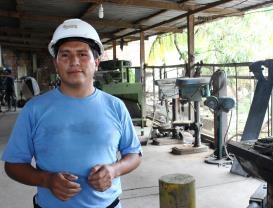
June 2014—In Peru, the forestry sector has the potential to become one of the most dynamic sectors within the domestic economy. With more than 70 million hectares of Amazonian forest, sustainable timber harvesting can benefit both the region’s workers and its companies.
In 2013, USAID’s Peru Bosques Project implemented the International Quality Management Program (PSGC), which seeks to generate change at an organizational and individual level through training and technical assistance for managers and workers to improve productivity and competitiveness; increase sales; and strengthen micro and small enterprise management. The program focuses on preparing the environment; using best practices for waste removal, organization, cleanliness, hygiene and order; establishing effective partnerships; and fostering strategic processes and vision.
The Peru Bosques Project works in partnership with the Ministry of Production, the Regional Government of Ucayali, and the Belgian Technical Cooperation.
MAILSAC, a plywood production company in the city of Pucallpa in the Ucayali region, is among 15 companies that participated in the PSGC. Helmer Lozano, a company engineer, recalls that there was a lack of order and organization at the plant before the program. Scraps and waste accumulated, cumbersome plywood production processes demanded non-stop work with no days off, and increased company costs were on the rise.
“We were not aware of the cost of keeping the premises clean, nor did we inspect the machinery, and our plywood was not of the highest quality,” said Lozano. “Thanks to the PSGC, we learned about the importance of order and cleanliness and how these factors affect production processes. Today, we have reduced processes, improved our machinery, and are minimizing our environmental impact by reducing gas emissions.”
Thanks to the techniques learned through the PSGC, MAILSAC has reduced production costs by 15 percent, or $4,000 per week. While the company used to pay to transport scraps off the premises, today it uses them as fuel for the boiler, which in turn generates thermal energy to dry plywood sheets. MAILSAC now produces top quality plywood through streamlined processes and has seen an increase in sales that is growing every quarter. Thanks to the PSGC, the company continues to improve the quality of its products and internal processes. These improvements have also led to better working conditions, increased wages and heightened productivity.
Following 10 months of training, the 15 participating firms are seeing the results of focusing on quality and improving production processes. Integrating business management systems founded on principles of quality, sustainability and environmental stewardship have allowed these firms to learn from experience, improve standards and continue to grow successfully, all while protecting forest resources.
The Peru Bosques Project, which runs from July 2011 to July 2016, is designed to achieve: a legal and regulatory framework to protect Peru's forest sector, a sustainable conservation of biodiversity in the country's Amazonian forests, and increased economic opportunities for businesses and native communities that make products from the forests' natural resouorces.
Links
Follow @USAIDPeru, on Facebook, on Flickr







Comment
Make a general inquiry or suggest an improvement.